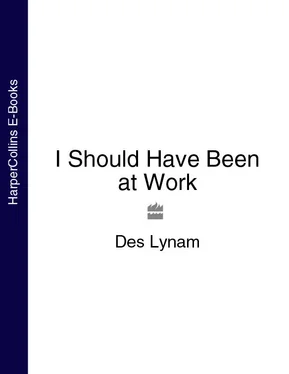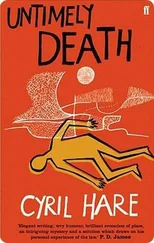The outcome of our conversation was that I telephoned Southern Television and told them I wasn’t taking the job. They were not best pleased with me. It would be another twenty-three years before I did make my move to ITV.
Some time later, Cliff, who had moved back to television, fixed me up with the chance to present two days’ racing at the Grand National meeting, on the Thursday and Friday before the big day itself. Once again I felt less than comfortable. Nowadays I envy those young presenters on satellite television who get their break reading the sports news off an autocue in front of a minimal audience. At least they have the time to get used to a TV camera up their snout. I was out in the wind and rain of Aintree, notes blowing all over the place, desperately trying to remember where I was, who I was, and what the hell I was doing there. By the Friday night I had convinced myself that live television was not for me, and was tempted to write to Southern Television to tell them what a lucky escape they had had. Once again, though, I received a very kind note, this time from the Head of BBC Television Sport, Alan Hart. He thanked me for making what he thought had been ‘a first-class contribution to the programmes’ and wrote that it was the opinion of everyone in his department, not just his. He also mentioned that if I felt disposed to appear on the box again, I should ring him and arrange lunch. I didn’t, and I didn’t. I would not in my wildest dreams have thought then that I would have ended up presenting the Grand National broadcast, one of the most prestigious and difficult events that BBC Television covers, for fifteen years running.
I didn’t call Alan but amazingly enough later in that year, 1977, he called me. He said he had been discussing me with Cliff and that he and I should meet, which we did at the Chelsea home of the racing commentator Julian Wilson. Over lunch, Alan spelled out that he thought – despite my fears and lack of confidence – that my future lay in television and that, once I really got the hang of it, the future could be rosy. I didn’t believe a word he was saying, but a part of me wanted him to be right. I actually thought a bit of fame might not go amiss.
Eventually Alan made me an offer. It was for a three-year contract with BBC Television at nearly twice my then salary of just short of £7,000. That was the part of the deal that encouraged me to move. I thought, I’ll have one more go. I can always go back to radio. I had to resign my comfortable staff job and now, apparently, I needed someone called an ‘agent’.
An agent. I had never needed one before. I had simply taken the salary offered me by the BBC and any increases they had felt like giving me in the eight or so years I had been a radio broadcaster. I had started on just over £2,000 a year at the end of 1969, and by 1977 I was earning the princely sum of close to £7,000 a year. I had been totally content with this compensation. I had a pleasant place to live, usually a nice sports car, and when I wanted to eat out or buy my friends a drink I could afford to do so. Money hadn’t really entered the equation. I could have still been in the insurance business. I was mostly thanking my lucky stars, David Waine and Angus McKay, for changing my life.
But now the BBC wanted to double my money – unimaginable riches. So I took the plunge and decided to have a real go at television. I went with the blessing of Bob Burrows, an old Angus hand, who had taken over as the boss of radio sport, with Cliff moving back to be Head of Outside Broadcasts at Television. He promised me that, if it didn’t work out, I could return to the fold, and anyway he wanted me to continue as the radio boxing commentator, which I did for many years, until the early Nineties.
But an agent. Why did I need an agent? Cliff explained that now I was a potential contractee, it would be necessary to renegotiate my deal from time to time and that it would be much better to have an intermediary involved. They need have no shame in making any demands and, at the same time, the BBC could be honest and direct about the broadcaster’s talents or deficiencies without being personal or hurtful.
I didn’t know any agents, so Cliff recommended the most powerful one around, a gentleman called Bagenal Harvey. Bagenal’s first client had been the outstanding English cricketer of his day, Denis Compton, who was also an Arsenal and England footballer. Denis had not only been cavalier with his wonderful skills but had been much the same with his business opportunities. Bagenal had found that Denis had a pile of unanswered letters, which contained various lucrative offers for product endorsements. Bagenal asked if he could deal with them and take a cut. That’s how Denis became the first ‘Brylcreem boy’ and how Bagenal Harvey started in the agency business. By now, though, he had numerous clients, many in broadcasting, including the two big hitters in television sports presentation at the time, David Coleman and Frank Bough. It occurred to me that I might be better off with an agent who was not representing the men in the jobs I aspired to, but I went to see Bagenal on Cliff’s recommendation.
The meeting did not go well. I thought Bagenal Harvey was interviewing me in the manner that he might adopt when hiring an office boy. ‘Mr Harvey,’ I interjected, I suppose rather cockily in retrospect. ‘I have not come here to be interviewed for a job. I have the job. I have come here to decide whether or not I want to hire you to work for me.’ The meeting came to a fairly swift end. Later, I got a call from Cliff. ‘What have you done to Bagenal Harvey? He’s not very happy with you and he’s a dangerous enemy.’ I explained my position and I think secretly Cliff admired me for my stance.
But I still needed an agent, and so I rang my old friend John Motson, who had made a highly successful transition from radio to television a few years earlier. He was using as his agent a chap who was entirely new to the business, a chartered accountant by profession called John Hockey. I went to see John and we formed a pretty good partnership for the next thirteen years.
But now, what was my role to be in television? Coleman, Bough and Harry Carpenter were filling the main presentational roles, and there were people like David Vine and Tony Gubba, more than capable broadcasters, backing them up. Firstly, I took over a slot called Sportswide , a fifteen-minute programme tacked on the back of the early evening news and magazine programme, Nationwide. Frank Bough, busy man as he was in those days, was also doing the main show, as was Sue Lawley.
It was fairly seat of the pants stuff. My seat was usually vacated by Frank or Sue, or one of the other Nationwide presenters, a few seconds before I began my piece. The same applied to my producer and director, who almost had to fight their way into position in the gallery.
I had a couple of early disasters. We used autocue for the programme, unless we were at an outside broadcast, and the system in those pre-computer days was pretty basic. One was actually reading from a roll of paper rather like a narrow toilet roll; sometimes it became detached and one had to adjust quickly to the script on one’s lap and/or hope you could remember the lines. On one occasion the operator had typed the same paragraph twice. I hadn’t had a chance to spot it before going on air and was halfway through repeating myself, word for word, when I had the presence of mind to say, ‘I’m sorry, I’m repeating myself’ and got away with it.
Sometimes we would record part of the slot and I would link in and out of it ‘live’. The recorded insert would include me in vision. On one occasion the make-up girl, seeing that my hair was too long before the live part of the programme, suggested ‘tidying up my ends’. Like a fool I let her do it, and she went a bit over the top. The viewer at home saw me with short hair, then long hair, then short hair again, all in the same broadcast.
Читать дальше












